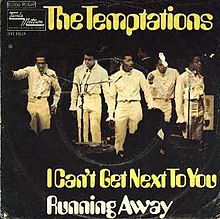This article needs additional citations for verification. (November 2013) |
"I Can't Get Next to You" is a 1969 No. 1 single recorded by the Temptations and written by Norman Whitfield and Barrett Strong for the Gordy (Motown) label. The song was a No. 1 single on the Billboard Top Pop Singles chart for two weeks in 1969, from October 18 to October 25, replacing "Sugar, Sugar" by the Archies and replaced by "Suspicious Minds" by Elvis Presley. The single was also a No. 1 hit on the Billboard Top R&B Singles for five weeks,[2] from October 4 to November 1, replacing "Oh, What a Night" by the Dells, and replaced by another Motown song, "Baby I'm For Real" by the Originals.
| "I Can't Get Next to You" | ||||
|---|---|---|---|---|
 | ||||
| Single by the Temptations | ||||
| from the album Puzzle People | ||||
| B-side | "Running Away (Ain't Gonna Help You)" | |||
| Released | July 30, 1969 | |||
| Recorded | Hitsville USA (Studio A); June 23, June 24, June 27, June 30, July 2, and July 3, 1969 | |||
| Genre | Funk, psychedelic soul | |||
| Length | 2:51 | |||
| Label | Gordy G 7093 | |||
| Songwriter(s) | ||||
| Producer(s) | Norman Whitfield | |||
| The Temptations singles chronology | ||||
| ||||
| "I Can't Get Next to You" | ||||
|---|---|---|---|---|
 | ||||
| Single by Al Green | ||||
| from the album Al Green Gets Next to You | ||||
| Released | November 1970 | |||
| Recorded | Memphis, Tennessee; 1970 | |||
| Genre | R&B[1] | |||
| Length | 3:48 | |||
| Label | Hi 2182 | |||
| Songwriter(s) | Norman Whitfield Barrett Strong | |||
| Producer(s) | Willie Mitchell | |||
| Al Green singles chronology | ||||
| ||||
The single was the second of the Temptations' four No. 1 hits on the United States pop charts, and was also one of the best-selling singles the group released. Billboard ranked it as the No. 3 song for 1969.
The applause that starts the song, which is cut short by Dennis Edwards' spoken "Hold it, hold it, listen" line, was sampled in another Temptations song "Psychedelic Shack".
Overview
edit"I Can't Get Next to You" was the second single from the 1969 Temptations LP Puzzle People, with "Running Away (Ain't Gonna Help You)", a ballad led by Paul Williams, as the b-side. The single was a No. 1 hit on both the Billboard Hot 100 chart and the Billboard Top R&B Singles chart. The song has been frequently covered, most notably a 1970 version by Al Green, a slower-paced version without multi-lead vocals. Green's cover, the title track of his 1971 LP Al Green Gets Next to You, reached No. 60 on the Billboard Hot 100, and No. 11 on the R&B chart. Annie Lennox also covered the song on her 1995 album Medusa.
Personnel
edit- Lead and background vocals by Dennis Edwards (verses; choruses; outro), Eddie Kendricks (verses; choruses), Paul Williams (verses), Melvin Franklin (verses), and Otis Williams (last verse)
- Written by Norman Whitfield and Barrett Strong
- Produced by Norman Whitfield
- Instrumentation by the Funk Brothers.
Chart history
edit
The Temptationsedit
|
Year-end chartsedit
All-time chartsedit
|
Al Green
edit| Chart (1970–71) | Peak position |
|---|---|
| U.S. Billboard Hot 100[11] | 60 |
| U.S. Billboard R&B | 11 |
| U.S. Cash Box Top 100[12] | 70 |
See also
editReferences
edit- ^ Marsh, Dave (1989). The Heart of Rock & Soul: The 1001 Greatest Singles Ever Made. Plume. p. 522. ISBN 0-452-26305-0.
- ^ Whitburn, Joel (2004). Top R&B/Hip-Hop Singles: 1942-2004. Record Research. p. 571.
- ^ "Item Display - RPM - Library and Archives Canada". Collectionscanada.gc.ca. 1969-10-25. Retrieved 2019-12-03.
- ^ "Official Charts Company". Retrieved 2019-10-09.
- ^ Joel Whitburn's Top Pop Singles 1955–1990 - ISBN 0-89820-089-X
- ^ Cash Box Top 100 Singles, October 25, 1969
- ^ "RPM Top Singles of 1969". Library and Archives Canada. RPM. 17 July 2013. Retrieved 24 December 2017.
- ^ Musicoutfitters.com
- ^ "Cash Box Year-End Charts: Top 100 Pop Singles, December 27, 1969". Archived from the original on January 25, 2019. Retrieved December 3, 2019.
- ^ "Billboard Hot 100 60th Anniversary Interactive Chart". Billboard. Retrieved 10 December 2018.
- ^ Joel Whitburn's Top Pop Singles 1955–1990 - ISBN 0-89820-089-X
- ^ Cash Box Top 100 Singles, December 19, 1970